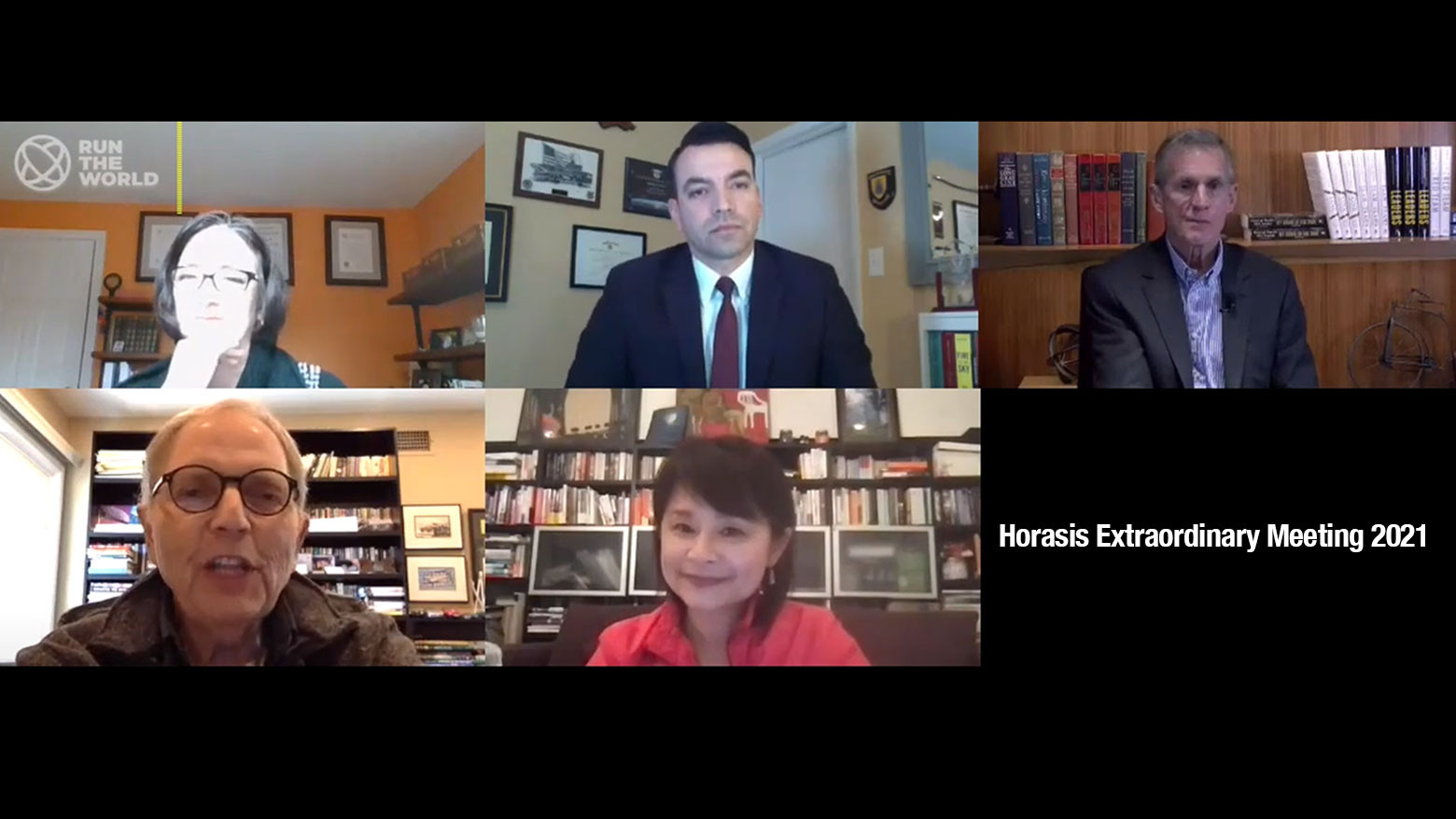Participants:
Ebara Miki (moderator); General Stanley McChrystal (ret), former commander of Joint Special Operations Command; Lt. Col. Jacob Sotiriadis, US Air Force chief of strategic foresight; Jerrold Green, President and CEO of the Pacific Council on International Policy; Mireya Solis, Director of Center for East Asia Policy Studies at the Brookings Institution; Robert Charles, former Assistant Secretary of State (contributed in writing).
The next war will look very different from conflicts of the past
Ebara Miki: Let’s kick off our conversation with this: What will the next large-scale conflict involving the United States look like, and what needs to be done to prepare for it?
Gen. Stanley McChrystal: We have no idea what the next major power conflict will look like. There has been too much progress in technology in the last two decades without us having the ability to mix it all together like different chemicals. We will be in the next war before we know how it's going to be fought. One thing I am confident in saying is that the next war is going to be very different from the past and that the entire structure of nations and entities will be involved simultaneously. That's because what used to be considered as the rear is now reachable by cyberattacks, by information warfare, influence on supply chains, at the same time as the frontlines. That's a very different dynamic than past wars. And that's going to change the nature of all of our roles, be it combatants or members of the population.
Lt. Col Jacob Sotiriadis: When we talk about the future, the basic premise is that the future as a singular entity doesn't exist. There are many possible futures and all of them are constantly in flux. As for the security landscape of the future, it's helpful to understand how we can formulate and use our imagination to develop some useful scenarios. We're never going to completely mitigate uncertainty in national security. We need to embrace that uncertainty and a method to apply the discipline of strategic foresight. We have to ask ourselves what are the weak signals in the emerging trends we see today in the environment. And that's not only looking at material capabilities — things like automation and human-machine teaming and artificial intelligence. But we also need to understand the new ideological models that we see in countries like China and Russia that are going to become the primary threats. Understanding intent and how situational dynamics play out besides just the strictly material is going to be very important

The future is all about Asia
Jerrold Green: I want to focus on the word “intractable”, as somebody who specializes in the Middle East, which is where the word intractable was invented. Iran, Iraq, Afghanistan, Libya, Lebanon, Yemen: there's a whole list of intractable conflicts, but we've come to the realization that these are not major national priorities for the United States. It's interesting that the new secretary of defense is the former head of Central Command, but for him, it's going to be all about Asia. And in fact, he's traveling this week with the Secretary of State. They're meeting the Chinese.
Mireya Solis: I agree that Asia is going to be a major center of attention for U.S. foreign policy, not only because China is a challenge for US defense planners, but because Asia is the most dynamic economic region and host to some of the most advanced manufacturing capabilities in semiconductors and high tech. I believe Asia is coming to form an economic architecture which the United States is not a part of. That's one challenge. We also face a challenge for credibility because from one administration to the next, we see sharp swings of policy priorities and tactics. And because we have stepped out of a major, negotiated agreement (*the Trans-Pacific Partnership agreement, or TPP), we face a test of confidence. I agree completely that defensive measures to prevent leakage of critical technology is central. But if there's one element of commonality to the Trump administration and the Biden administration, it is that economic security is national security and that's a slippery slope and very easily can lead to protectionism.
Lessons from COVID-19: leadership and alliances
Ebara: The coronavirus pandemic isn’t a military conflict but it is a major emergency that has killed hundreds of thousands of people in the US. What lessons have we learned from this?
McChrystal: I had the opportunity to be on the Council on Foreign Relations Task Force and looked at this issue, and the conclusion was that COVID-19 was not a surprise. The exercise, code-named “Crimson Contagion”, conducted by HHS (*a simulation run by the Trump administration’s Department of Health and Human Services in 2019 to estimate the effects of an influenza pandemic on the US), showed a scenario remarkably similar to what actually played out. We had reason to expect it at some point. But we didn't either resource or execute what we knew. The question here is, can we respond to uncertain emerging threats? Can we get enough people going in the same direction so that we can make decisions that actually have an impact? Look how quickly we've prepared a vaccine, that’s a triumph of science. But on lot of other levels of the response, the narrative around it, the discipline about it, the leadership associated, the use of alliances [was not good].
The reality of COVID-19 is you don't beat it anywhere until you beat it everywhere. And so, it requires a different mindset.

Green: The pandemic should be a humbling experience for humankind writ large. No single country can deal with these issues alone. Borders are so porous, and people move around the planet so easily. And frankly, the importance of US leadership showed in that everybody on the planet would go to the CDC for advice. That's a responsibility we should live up to. The lessons we’ve learned from this hold true in areas far beyond epidemiology and public health.
Solis: What COVID-19 has taught me is that leadership is really a test of competence and of governance. The countries that have dealt well with the pandemic were really coming ahead and demonstrating that ability. And it's encouraging to see Asian democracies handle it well and show that we do not need these very intrusive systems of surveillance to keep track of our citizens. That's a model that gives us confidence of the benefits of democracy. But on the other hand, COVID-19 has been very discouraging on the international economic relations front because that has put a mirror to economic nationalism, starting with restrictions on personal protective equipment last year and now we're seeing it with the vaccines.
Weaponization of disinformation
Ebara: We also saw the harmful effects of disinformation during the pandemic. Could this be used in conflicts?
Sotiriadis: I'm worried about disinformation. It has been weaponized. We are seeing it before our eyes. It's going to be a central aspect of conflicts in the future, especially when we look at the potential for deep fakes and disinformation. It's not going to be necessarily a singular actor that's doing this. We could see a congruence of all our adversaries doing this, targeting all facets of our society. And so, how do we educate our society? That is not just a national security dilemma. We have to have the warning mechanisms in place and the means to combat disinformation. But it also behooves us to have a population that understands and wants to understand.
McChrystal: We can be in the midst of something that's much more dangerous than we are willing to admit long before we start doing anything about it. I'm concerned about it because I don't think just education will do it. I think we're going to need national policies. We're dealing with something on the level of nuclear warfare. And if we don't develop some doctrine and international understanding about it, we are going to bump into each other at some point with great consequence.
The New Era of Great Power Competition
Ebara: There has been a lot of talk about a return to Great Power Competition, with China as the number one competitor to the US. Are we seeing the start of a new Cold War?
Solis: I don't think the Cold War analogy stands because these are heavily integrated countries, their webs of economic interdependence are very dense and deep. I also think that our allies are not interested in the talk of full-scale decoupling because they understand the significant cost. And in this context of Great Power Competition, governments begin to focus more on what we call relative gains. If there is an economic transaction, who benefits more from that? The United States has tightened its screening of foreign direct investment and its export controls, imposed sanctions on Chinese telecom, and China is ready to engage in that kind of behavior as well. It is not the Cold War but we're in the darkness, touching the walls, trying to find out how we come out of this. And what will be interesting with the Biden administration is that it’s trying to shift its approach in the sense that it's not all-out competition but to see if there is a possibility for cooperations to pursue.

McChrystal: I'm not sure that it's not a Cold War again. I'm not sure the Chinese don't think it's a Cold War. It matters what both sides think. What I see of internal Chinese military writings, there's a pretty strong nationalist line that gets close to arrogance. We may find that China is in a position where it feels that we are in a Great Power Competition that is more than just competition. It is an adversarial relationship. I completely agree on the interconnectedness between economies but I'm not sure that it is as overwhelmingly powerful as I'd like to believe it is. I worry that maybe this is Cold War and we're a little in denial.
Ebara: Jerry, you've spent some time in China. How does Beijing view the US?
Green: I think that on one hand, Beijing would like a more reliable, predictable US policy. But on the other hand, it’s figured out that there are ways to take advantage of the uncertainties coming out of Washington. This is not the Cold War that we all remember, but it's something more than ordinary tension, a steady stream of distrust, uncertainty and a willingness to be aggressive. Even Chinese diplomats are much more outspoken and aggressive than they used to be. Why? Because they think they can do it. So, we really cannot be complacent. There's a lot of risk.

Sotiriadis: I'd love to pick up on that idea of short sightedness. In the mid-2000s, I can recall that the official line in the Department of Defense was that the Great Power Competition was essentially over and wasn't going to be the major focus. Our threats were coming primarily from terrorist groups. But now we've come back full circle. If we look at China, what's happening with neo-Confucianism, sort of resorting to this notion of Chinese ethnocentric nationalism that rests upon this almost religious type of Confucianism that was completely taken away under Chairman Mao and now is becoming more popular with Xi Jinping who is using it to stoke that nationalist narrative. Until we can harness those dynamics in a better way to understand how that manifests into foreign policy and security challenges, we're going to have a tough time.
US and its alliances
Ebara: President Biden has vowed to repair alliances through diplomacy and restore Washington's leadership position on the global stage. What is the value of these alliances on the battlefield?
McChrystal: They're totally critical. They were critical on the battlefield in Afghanistan. We had 46 nations in the coalition and they all had different levels of strength and equipment. But they were all valuable in the sense that we were not alone. We were not a single colonial or imperial empire trying to build coalitions. Also, the strength of diversity makes the coalition more resilient because you don't have a single ideology or strong person that takes it in an extreme way. If you have a network of alliances, they bring different capabilities to put pressure points not just from the battlefield, but as nations. And so if someone wants to be a bad actor who takes certain aggressive actions, if you have an alliance, you've got the ability to put on economic pressure, cultural pressure, sometimes natural resource pressure, all from different angles, that there are ways to constrain aberrant or unacceptable behavior. If we don't have alliances, we're literally dead in the water.
Ebara: Were you worried by how the US was treating its allies in recent years?
McChrystal: Yes. The first lesson of dealing with allies is that you don't criticize them. The fact is that everybody matters. If you are part of an alliance and you think you don't really matter, you're not committed to that alliance. The beauty of Article Five of NATO (*which commits each member state to collective defense) was that everybody believed it. They believe that if they were attacked, they were going to be the beneficiary of mutual defense. If people doubt that, they start to think maybe you won't come. Then the entire strength of the alliance is degraded.
Sotiriadis: Just look at how differently China and the United States conceptualize alliances. The Chinese don't have the kinds of alliances that the United States has. And frankly, they want it that way because they view alliances as a burden. They don't view them as a force multiplier in the sense that we do. They'd rather have tributary type states rather than alliances because alliances you have to give and take. You have to come to your ally’s aid. I don't believe that that model really fits in with the Chinese vision for how they want to do business.
Solis: The global network of alliances is the greatest asset for the US, which our strategic competitor does not have. We hear a lot about creating “situations of strength.” I think that Japan actually is not appreciated enough for how much it can support the US in creating those situations of strength in this economic competition. First, Japan rescued the comprehensive trade agreement, TPP, which in many ways does have that toolkit of disciplines that addresses China's mercantilism. Also, because Japan is a true peer competitor of China when it comes to infrastructure investment finance. And finally, when we think about supply chain resilience, which is the focus today of U.S. policy, Japan has a very successful experience with reducing dependence on China's rare metals after the 2010 embargo and we can learn more about a policy that's not just about re-shoring but diversification.
In his written responses, former Assistant Secretary of State Robert Charles stresses the need for the international community to use diplomacy to navigate the multiplying threats from China, Iran, Russia, and North Korea. However, he warns that failed efforts at diplomacy can cause adversaries to misjudge relative power and intentions, and lead to preventable conflicts. He says the Biden administration should be willing to change course depending on policy while still speaking truth to “illegitimate actors and deliver consequences affirming the US will to defend territory and individual rights.”


